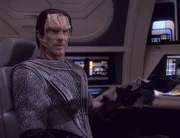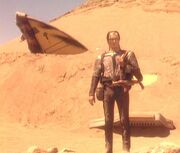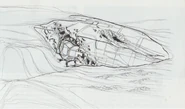mNo edit summary |
m (→top: fm) |
||
| (One intermediate revision by one other user not shown) | |||
| Line 1: | Line 1: | ||
{{Sidebar starship class| |
{{Sidebar starship class| |
||
| − | | |
+ | |name= ''Ravinok''-type |
|image= Ravinok.jpg |
|image= Ravinok.jpg |
||
| − | | |
+ | |caption= Remains of the ''[[Ravinok]]'' |
| − | | |
+ | |affiliation= [[Cardassian Union]]<br>[[Cardassian Central Command]] |
| − | | |
+ | |type= [[Starship]]<br>[[Military vessel]] |
| − | | |
+ | |active= [[2360s]] |
| − | | |
+ | |crew= 18 |
}} |
}} |
||
| − | The ''''' |
+ | The '''''Ravinok'' type''' was a [[Cardassian]] [[starship|ship]] design utilized by the [[Cardassian Union]] and operated by the [[Cardassian Central Command|Central Command]] during the mid-[[24th century]]. |
== Technical data == |
== Technical data == |
||
| − | The ''Ravinok'' |
+ | The ''Ravinok'' type was a [[warp-capable]], [[directed energy weapon]] equipped [[military vessel]] that was in operation during the [[2360s]]. Such vessels were easily outnumbered in combat against [[Breen warship]]s. |
These vessels could operate with a crew of eighteen [[troop]]s, and additionally were capable of transporting up to thirty-two [[prisoner]]s. |
These vessels could operate with a crew of eighteen [[troop]]s, and additionally were capable of transporting up to thirty-two [[prisoner]]s. |
||
[[File:Ravinok sensor array fragment.jpg|thumb|left|Fragment of the ship's forward sensor array]] |
[[File:Ravinok sensor array fragment.jpg|thumb|left|Fragment of the ship's forward sensor array]] |
||
| − | As was common among |
+ | As was common among Cardassian vessels, the ship's [[hull]] was partially composed of a [[uridium]] [[alloy]], including the ship's [[forward]] [[sensor array]]. |
| − | The [[crash land]]ed ''Ravinok'' was located in [[2373]] from the faint [[magneton]] signature |
+ | The [[crash land]]ed ''Ravinok'' was located in [[2373]] from the faint [[magneton]] signature caused by the residual [[radiation]] from a damaged [[warp nacelle]]. |
{{clear}} |
{{clear}} |
||
| Line 25: | Line 25: | ||
{{dthumb|Ravinok damage sketch.jpg|Ravinok damage.jpg|Eaves sketch|Zimmerman's final product}} |
{{dthumb|Ravinok damage sketch.jpg|Ravinok damage.jpg|Eaves sketch|Zimmerman's final product}} |
||
| − | The original sketches of the Ravinok crash-landed on Dozaria was designed by [[John Eaves]]. (''[[Star Trek: Deep Space Nine Companion]]'', p. 277) |
+ | The original sketches of the ''Ravinok'' crash-landed on Dozaria was designed by [[John Eaves]]. (''[[Star Trek: Deep Space Nine Companion]]'', p. 277) |
Producer [[Steve Oster]] continued, "''There was this huge, three-story mound of gravel in the quarry, and if you went up to the base of it and put your foot in it, part of it would come down,''" said Oster. "There was a lot of concern about that, and while construction was going on, we were constantly aware of it. We ended up building the ship on flat ground away from the hill and then just tapping the hill down onto it. They put the pieces as close as they dared get and then filled the mountain in behind it.''" Because landslides were such a real possibility, [[Nana Visitor]]'s brief interior shots of inside the ship were filmed on the [[Paramount Pictures]] lot. According to Oster, "''Construction said, 'We're not putting ''anybody'' inside this set,' because if the mountain goes –''" Ultimately, the mountain stayed put and didn't collapse. (''[[Star Trek: Deep Space Nine Companion]]'', pp. 276-277) |
Producer [[Steve Oster]] continued, "''There was this huge, three-story mound of gravel in the quarry, and if you went up to the base of it and put your foot in it, part of it would come down,''" said Oster. "There was a lot of concern about that, and while construction was going on, we were constantly aware of it. We ended up building the ship on flat ground away from the hill and then just tapping the hill down onto it. They put the pieces as close as they dared get and then filled the mountain in behind it.''" Because landslides were such a real possibility, [[Nana Visitor]]'s brief interior shots of inside the ship were filmed on the [[Paramount Pictures]] lot. According to Oster, "''Construction said, 'We're not putting ''anybody'' inside this set,' because if the mountain goes –''" Ultimately, the mountain stayed put and didn't collapse. (''[[Star Trek: Deep Space Nine Companion]]'', pp. 276-277) |
||
Revision as of 16:17, 20 November 2019
The Ravinok type was a Cardassian ship design utilized by the Cardassian Union and operated by the Central Command during the mid-24th century.
Technical data
The Ravinok type was a warp-capable, directed energy weapon equipped military vessel that was in operation during the 2360s. Such vessels were easily outnumbered in combat against Breen warships.
These vessels could operate with a crew of eighteen troops, and additionally were capable of transporting up to thirty-two prisoners.

Fragment of the ship's forward sensor array
As was common among Cardassian vessels, the ship's hull was partially composed of a uridium alloy, including the ship's forward sensor array.
The crash landed Ravinok was located in 2373 from the faint magneton signature caused by the residual radiation from a damaged warp nacelle.
Background information
The Ravinok was never explicitly described as anything other than a "Cardassian ship" in the episode's dialogue. Dukat clearly stated that it was some sort of military vessel; indeed, one that was transporting a prisoners, suggesting that it was perhaps a prison transport, but nothing more.
The original sketches of the Ravinok crash-landed on Dozaria was designed by John Eaves. (Star Trek: Deep Space Nine Companion, p. 277)
Producer Steve Oster continued, "There was this huge, three-story mound of gravel in the quarry, and if you went up to the base of it and put your foot in it, part of it would come down," said Oster. "There was a lot of concern about that, and while construction was going on, we were constantly aware of it. We ended up building the ship on flat ground away from the hill and then just tapping the hill down onto it. They put the pieces as close as they dared get and then filled the mountain in behind it." Because landslides were such a real possibility, Nana Visitor's brief interior shots of inside the ship were filmed on the Paramount Pictures lot. According to Oster, "Construction said, 'We're not putting anybody inside this set,' because if the mountain goes –" Ultimately, the mountain stayed put and didn't collapse. (Star Trek: Deep Space Nine Companion, pp. 276-277)

Ravinok wings protruding from the sand
According to Herman Zimmerman, "We had to imply that something the size of a Cardassian freighter could actually be located in this quarry [at Soledad Canyon]. And we had taken some big set pieces with us that we'd painted, no knowing what, if anything, we were going to do with them." Zimmerman explained that "They were about ten feet square, painted like the color of the hull of a ship. And one of them was just laying against this very fine gravel that looks like sand, and I thought, that looks like a piece of fuselage that's been uncovered while the rest of the ship is covered with sand. So we intentionally buried just those two pieces of ten by ten, side by side, and covered the edges with sand, so it looked like the side of a ship sticking out. We added a couple of wings and that helped a lot." (Star Trek: Deep Space Nine Companion, p. 276)


